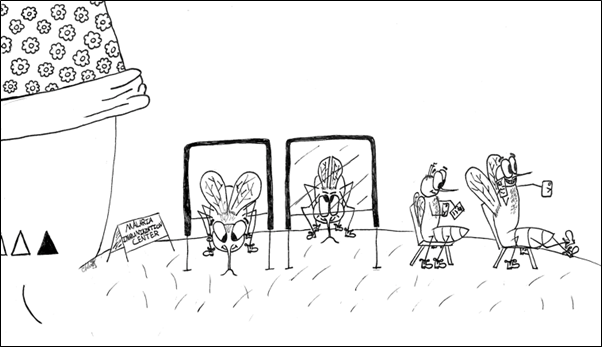BIOCHEMISTRY CARTOON SERIES: PROTECTING HUMANS CAN COME FROM VACCINATING MOSQUITOES …SORT OF

Written by Brandon McLeod, Illustrated by Chloe Mitchell
Researcher: Brandon McLeod
Group: Julien Lab
With the ongoing SARS-CoV-2 pandemic, there has been widespread discussion regarding the different types of vaccines being developed. The startlingly high efficacy of the novel mRNA vaccines that both Pfizer and Moderna have recently brought to market have renewed interest in an unsettling question often posed to the vaccine design community: what do we do when conventional vaccine approaches are not sufficient to protect our populations?
The approach for vaccines against malaria needs to be improved, as ongoing pilot vaccine studies in Africa impart underwhelming immunity. Malaria is a major global health burden, resulting in nearly a quarter billion clinical cases and half a million deaths in 2019 alone. The disease is spread when a mosquito bites a person with malaria and that mosquito takes up the malaria parasite with the blood meal. The parasite then matures within the mosquito, and is transmitted to the next person it bites, infecting that individual. The Julien Lab at The Hospital for Sick Children has recognized an opportunity to develop an innovative vaccine approach by targeting the malarial parasite in the mosquito rather than the human host.
Traditional vaccines immunize individuals using a part of an infectious agent, such as a virus or bacteria, known as an antigen. The body is able to build antibodies against this antigen in order to generate protection against that pathogen upon future infection. However, the Julien Lab wants to target the parasite prior to human infection, a novel approach termed a Transmission-Blocking Vaccine (TBV). A TBV contains antigens that primarily function in the mosquito, not the human. One such antigen is Pfs48/45, a protein that is essential for the parasite to develop into its infectious form in the mosquito. The central idea here is that vaccinated individuals will generate antibodies against Pfs48/45, and when mosquitoes bite these individuals, they will take up the antibodies with the blood meal. Once in the mosquito, these antibodies are able to interact with the parasite and ultimately lead to its destruction. With no more infectious parasite in the mosquito, there is nothing left to transmit and the cycle of malaria infection is halted.
Using integrative structural biology, the lab has been able to characterize optimal antibody-antigen interactions, and is now working to engineer their immunogens to elicit a robust immune response that provides the maximum possible transmission-blocking activity. Excitingly, these TBVs could be combined with traditional vaccines, thereby protecting individuals from getting infected and also from transmitting malaria in their communities. As we have seen with the effective COVID-19 vaccines, overcoming global health challenges requires innovative science. The Julien Lab’s malaria TBVs aim to provide a next crucial step towards a healthier global community.
In this new ongoing series on Transcripts, Biochem PhD student Chloe Mitchell will share her original cartoons that depict research projects in our department. Each illustration will be accompanied by a written description of the research as well. The series continues here with a cartoon about work being done in the Julien Lab by Brandon McLeod!
